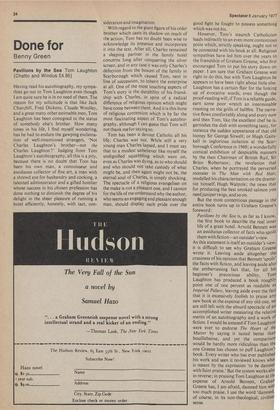Done for
Benny Green
Pavilions by the Sea Tom Laughton (Chatto and Windus £4.95)
Having read his autobiography, my sympathies go out to Tom Laughton even though I am quite sure he is in no need of them. The reason for my solicitude is that like Jack Churchill, Fred Dickens, Claude Woolley, and a great many other estimable men, Tom Laughton has been consigned to the status of somebody else's brother. How many times in his life, I find myself wondering, has he had to endure the gawping exclamation of well-intentioned strangers, `Not Charles Laughton's brother—not the Charles Laughton ?' Judging from Tom Laughton's autobiography, all this is a pity, because there is no doubt that Torn has been his own man, a connoisseur and assiduous collector of fine art, a man with a shrewd eye for husbandry and cooking, a talented administrator and a gifted hotelier whose success in his chosen profession has done nothing to diminish the degree of his delight in the sheer pleasure of running a hotel efficiently, honestly, with tact, con
sideration and imagination.
With regard to the giant figure of his older brother which casts its shadow on much of the action, Torn has no doubt been wise to acknowledge its presence and incorporate it into the text. After all, Charles remained a sleeping partner in the family hotel concerns long after conquering the silver screen, and in any case it was only Charles's defection from the bosom of the family in Scarborough which caused Tom, next in line of succession, to inherit the enterprise at all. One of the most touching aspects of Tom's story is the durability of his friendship with Charles, in spite of a radical difference of religious opinion which might have come between then. And it is this bone of religious contention which is by far the most fascinating aspect of Tom's autobiography, although 1 can guess that Tom will not thank me for saying so.
Tom has been a devout Catholic all his life; Charles was not. While still a very young man Charles lapsed, and I must say that to a modest unbeliever like myself the undignified squabbling which went on, even as Charles was dying, as to who should and who should not take custody of what might be, and then again might not be, the eternal soul of Charles, is simply shocking. The spectacle of a religious evangeliser on the make is not a pleasant one, and I cannot for the life of me understand why the author, who seems an engaging and pleasant enough man, should display such pride over the
good fight he fought to possess something which was not his.
However, Tom's staunch Catholicism leads indirectly to an even more contentious point which, strictly speaking, ought not to be connected with his book at all. Religious sympathies have led him over the years to the friendship of Graham Greene, who first encouraged Tom to put his story down on paper. I am sure that Graham Greene was right to do this, but with Tom Laughton he appears to have been right about little else. Laughton has a certain flair for the linking up of evocative words, even though the proof-reading will, if Tom is a reliable guide, earn some poor wretch an interminable roasting on the grills of hellfire. The narrative flows comfortably along and every now and then Tom, like the excellent chef he is, garnishes the dish with something tasty, for instance the sudden appearance of that old looney Sir George Sitwell; or Hugh Gaitskell in inglorious isolation at the Scarborough Conference in 1960; a wonderfully comical exhibition of despicable manners by the then Chairman of British Rail, Sir Brian Robertson; the revelation that Charles, when he portrayed the perverted monster in The Man with Red Hair, modelled his characterisation on the dramatist himself, Hugh Walpole; the news that for producing the best smoked salmon you need juniper twigs, and so on.
But the most contentious passage in the entire book turns up in Graham Greenc's foreword:
Pavilions by the Sea is, as far as I know, the first book to describe the real inner life of a great hotel. Arnold Bennett was an assiduous collector of facts who spoilt them with fiction—an outsider's view.
As this statement is itself an outsider's view, it is difficult to see why Graham Greene wrote it. Leaving aside altogether the crassness of his opinion that Bennett 'spoilt the facts with fiction, and leaving aside also the embarrassing fact that, for all his beginner's precocious ability, Tom Laughton has produced a book roughlY point one of one percent as readable as Imperial Palace, leaving aside even the fact that it is excessively foolish to praise anY new book at the expense of any old one, we are still left with the absurd spectacle of an accomplished writer measuring the relative merits of an autobiography and a work of fiction. I would be amazed if Tom Laughton were ever to endorse The Heart of the Matter by saying it tasted better than bouillabaisse, and yet the comparison would be hardly more ridiculous than the one Greene has chosen to puff Laughton book. Every writer who has ever publishec his work and seen it reviewed knows whal is meant by the expression 'to be damnet with faint praise.' But the system works alst in reverse; in praising Tom Laughton at tilt expense of Arnold Bennett, Grahan Greene has, I am afraid, damned him wnl too much praise. I use the word 'damned, of course, in its non-theological, civilise' sense.


































 Previous page
Previous page